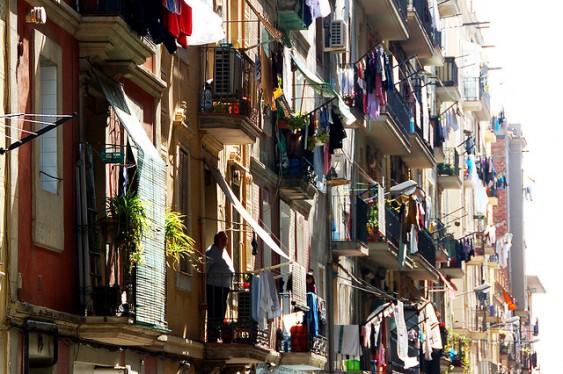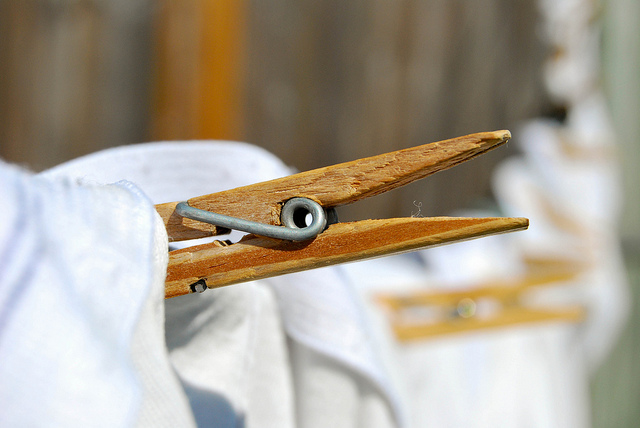British Columbia prides itself on a commitment to renewable energy. Yet many British Columbians are forbidden from stringing up the simplest of solar devices: the clothesline.
These laundry-drying bans are written into the bylaws of strata corporations, which govern most of British Columbia’s condominiums, apartments, duplexes, and townhomes. Condos are a big and fast-growing housing choice in the province. In just 20 years, the percentage of Vancouverites dwelling in them has nearly doubled from under 25 percent to more than 40 percent. A similar trend is evident across the province where, in 2008, investments in condos and apartments outpaced investments in detached homes for the first time. Moreover, from 2002 to 2008, investments in townhomes and duplexes more than doubled. British Columbia may have more than 1 million residents who are subject to strata bylaws.
Multiply that by clothes dryers’ prodigious appetite for electricity and you’ll see that the potential benefits of unbanning clotheslines mount quickly. Of all common household appliances, electric clothes dryers are second only to refrigerators in energy consumption. They account for more than 9 percent of BC’s residential electricity consumption, according to provincial utility BC Hydro sources here and here. Unbanning clotheslines would allow British Columbians to leave their dryers idle more of the time. Some 54 percent of British Columbians already report line drying their clothes at least some of the time.
If just half of condo and apartment dwellers in the province trimmed even a quarter of their dryer energy use by grabbing their clothespins more of the time, it would amount to energy savings of nearly 60 million kilowatt hours every year. That’s two thirds of residential electricity use in the city of Langley. What’s more, allowing condos to banish solar drying contradicts a fistful of provincial policies. It’s at odds, for example, with the province’s goals to cut greenhouse gas emissions, achieve electricity self-sufficiency, become a net clean-energy exporter, increase the percentage of its electricity generated from clean and renewable sources, and increase the share of electric vehicles on the road. The BC Energy Plan aims to decrease average household electricity consumption by 1,000 kilowatts per year by 2020: households that completely switch to hang drying will be more than 90 percent of the way toward this goal.

Given all the benefits of solar drying, why do condos ban clotheslines in the first place? Campbell Strata Management’s president Sanjay Maharaj, who works with scores of stratas, says, “to ensure aesthetics and make sure that the common areas and look of the building is kept neat and clean at all times.”
Well, there’s no arguing with tastes, but clotheslines can be beautiful. They can also be flags of freedom from dirty energy and expensive power bills. And whatever your personal sensibility, a rack of clothes drying on a condo balcony isn’t ugly like its alternatives: a strip mine; a coal train; a forest stricken with pine beetles; a town deluged, burned, or leveled by the worsened floods, fires, and storms that carbon-induced climate change is sending our way.
Of BC’s million or so strata residents, experts suspect a big majority live under prohibitions on line-drying of clothes outdoors, at least if the clothes are visible from outside the building. Sightline’s map shows nearly 30 specific examples of clothesline bans that I’ve found in British Columbia (drag the map to BC, if it’s not framed in your browser), but that number barely scratches the surface. Roughly 30,000 BC strata corporations are registered; most of them use stock bylaws written for their developers by a few dozen law firms and strata management companies. (British Columbia has no homeowner associations, unlike the Northwest states and other Canadian provinces, so its clothesline bans are almost exclusively in its strata corporations. In this way, it is already ahead of the Northwest states on the path to the right to dry. South of the 49th parallel, homeowner groups, condo associations, and local governments may all ban solar drying.)
I requested copies of the bylaw templates used by ten firms and received responses from half of them. All five firms either sent bylaws that include clothesline restrictions or indicated that they have included clothesline bans in the bylaws they draft. Three examples illustrate.
Clark Wilson LLP is one of Vancouver’s 10 largest law firms. The firm’s Strata Property Group has acted for more than 1,500 strata corporations. Its bylaw template, which according to partner Pat Williams is rejected by “very few” of the stratas it serves, includes a de facto clothesline ban:
A resident must ensure that no air conditioning units, laundry, flags, clothing, bedding or other articles are hung or displayed from windows, balconies or other parts of the building so that they are visible from outside of the building.
Victoria’s Gibraltar Management has offered customized strata management services since 2005. It offers several bylaw templates, and according to founder Marv Walker, they all restrict clotheslines.
Campbell Strata Management, which serves nearly 100 Vancouver strata corporations, is another representative example. A manager for the company said that she was “not aware of any stratas that we manage that allow clotheslines or clothes umbrellas.”
The company’s president, Sanjay Maharaj, offered his assessment:
At the end of the day, it is up to the Strata Corporation to see what they want in their by-laws and the owners have a say on this through a 3/4 vote.
Mr. Maharaj is right, in legal terms. In practical terms, though, he’s overstating how much “say” owners have. The difficulty of achieving a quorum (one third of owners), let alone the necessary 75 percent super majority of those present, is practically as hard as scoring a double hat trick; it’s not literally impossible, it’s just not something you see very often.
Once strata bylaws are written, then, it almost takes an act of parliament to change them. And that’s more or less what British Columbia ought to do next: an act of the provincial parliament, the legislative assembly, to recognize the right to dry and make null-and-void strata bylaws that abridge it. Ontario and Nova Scotia have already found the political will to become right-to-dry provinces. Surely British Columbia can do the same.
Jon Howland is a Seattle-based teacher, debate coach, and Sightline volunteer. Alan Durning edited this post.
Read more on clotheslines:


Comments are closed.